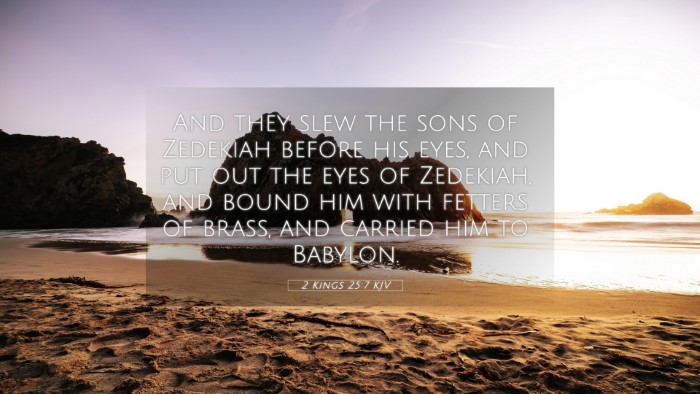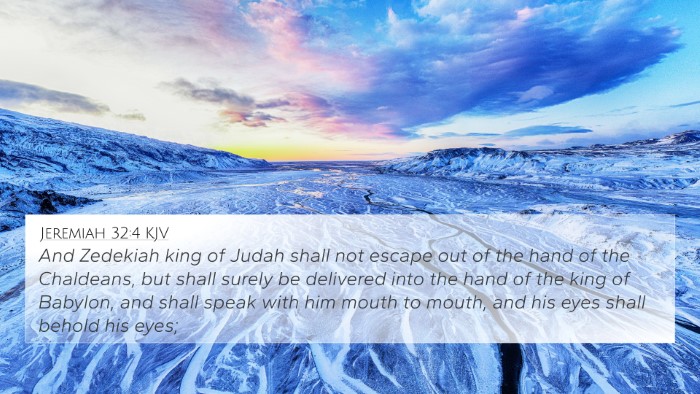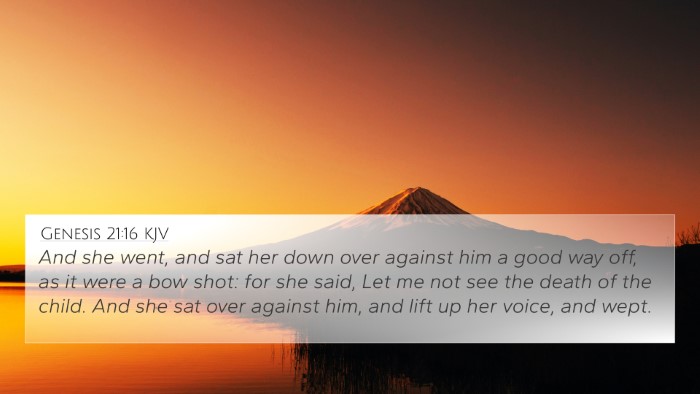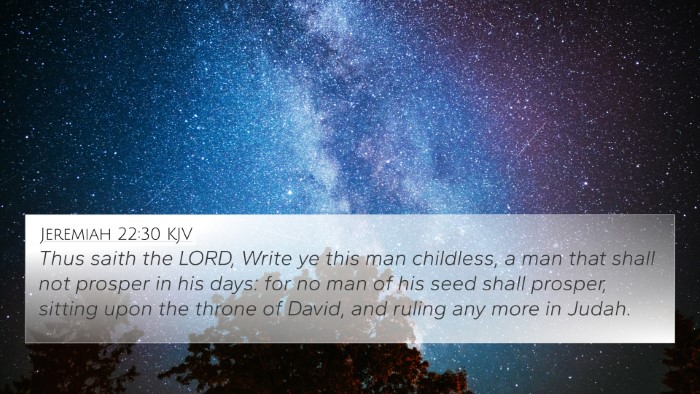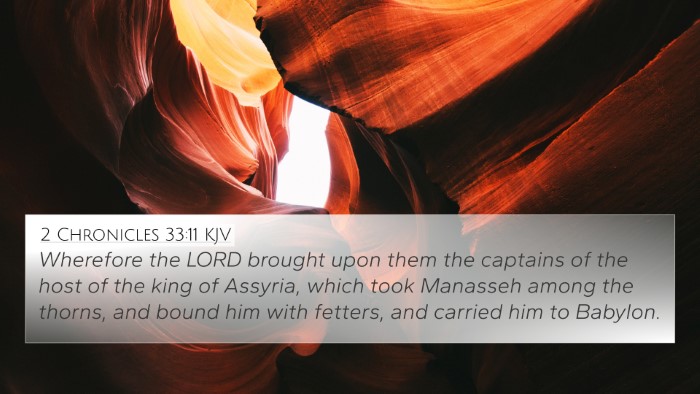Understanding 2 Kings 25:7
2 Kings 25:7 depicts the somber conclusion of the Babylonian siege of Jerusalem, capturing the fate of Zedekiah, the last king of Judah. The verse states, "They killed the sons of Zedekiah before his eyes, and they put out the eyes of Zedekiah, and bound him with chains, and carried him to Babylon."
Summary of the Verse
This verse signifies a pivotal moment in the history of Jerusalem and its monarchy. The act of blinding Zedekiah, along with the execution of his sons, symbolizes the total destruction of hope for the Davidic line and the kingdom of Judah. The imagery suggests the culmination of Judah's rebellion against God and the prophetic warnings delivered through various prophets, indicating that there are severe consequences to disobedience.
Commentary Insights
Matthew Henry's Commentary
Matthew Henry reflects on this tragic event as a fulfillment of divine judgment. He emphasizes that Zedekiah's disobedience to God and failure to heed prophetic warnings resulted in devastating outcomes. The death of his sons is described as the ultimate humiliation, not just for the king but for the entire nation of Judah, as it signifies the end of royal succession.
Albert Barnes' Commentary
Barnes interprets the blindness of Zedekiah as a metaphor for spiritual blindness, illustrating how sin blinds us to the consequences of our actions. He connects this narrative to God's justice, where Zedekiah's pride led him to ignore the advice from God’s prophets. The chains symbolize the shattering of his authority and the captivity of Judah itself.
Adam Clarke's Commentary
Clarke discusses the prophetic foresight in this tragedy, linking it to earlier prophecies regarding the fate of those who turn from God. He highlights how the Babylonian captivity serves as a dramatic reminder of God’s sovereignty and the necessity of remaining faithful. This moment is not merely historical; it is also a lesson in fidelity and the consequences of rebellion against divine authority.
Bible Verse Cross-References
Several other Scripture passages relate to 2 Kings 25:7, enriching its meaning and context:
- Jeremiah 39:6-7: The parallel account of the fate of Zedekiah, emphasizing the brutality faced by the last king of Judah.
- Jeremiah 52:10-11: Provides additional details regarding Zedekiah's captivity and the fate of his sons.
- Ezekiel 12:13: A prophetic reminder that Zedekiah would die in captivity, reinforcing the judgments pronounced over Judah.
- Ezekiel 21:25-27: Speaks of the calamity befalling the royal line due to their unrighteousness and failure to follow God's commands.
- Deuteronomy 28:32: A forewarning to Israel of the consequences of disobedience, including the sorrowful fate of children.
- Isaiah 39:6-7: Prophecies regarding the Babylonian exile, threading the narrative of judgment throughout the prophetic books.
- 2 Chronicles 36:15-17: Gives insight into the context of God's patience and the eventual destruction of Jerusalem by Babylon.
Thematic Connections in Scripture
This verse exemplifies themes of rebellion, suffering, and divine judgment strongly woven through the Biblical narrative. It invites theological reflection on:
- Divine Justice: The consequences that follow disobedience as highlighted throughout the Old Testament.
- Hope and Despair: The lost hope of the Davidic line through Zedekiah, serving as a foreshadowing of the hope found in Jesus Christ.
- Leadership and Accountability: The responsibility of leaders before God as clearly illustrated by Zedekiah’s failure.
Tools for Bible Cross-Referencing
For those interested in further exploring the connections between this and other scriptures, consider utilizing:
- Bible Concordances: Helps locate specific verses and their occurrences.
- Bible Cross-Reference Guides: Provide thematic connections and allow deeper study into cross-referenced verses.
- Cross-Reference Bible Study Methods: Methods focusing on linking scriptures to build a holistic understanding of themes.
- Bible Reference Resources: Books and online tools designed to facilitate scripture study.
Conclusion
2 Kings 25:7 serves not only as a historical account but also as moral and spiritual instruction. Its significance extends beyond Judah's fall, calling all readers to examine their own commitments to God and the implications of turning away from His word. By engaging with this verse and its related scriptures, one can draw profound insights that resonate throughout the entirety of the Bible.

